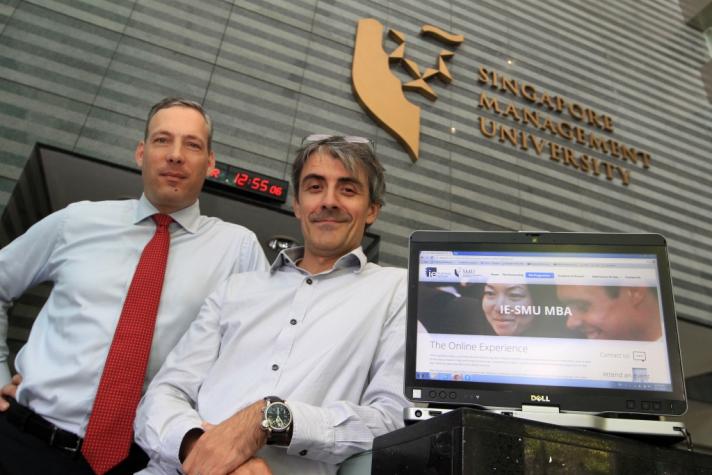
Singapore Management University (SMU) and Spain’s IE Business School are jointly offering the first MBA programme in Singapore that adopts a blended methodology. The course stands out as it combines online learning with face-to-face classes, thus offering greater flexibility to local and regional management executives who wish to upgrade themselves while still continuing to work. It will also help them strengthen their ability to leverage online technology for cross-border collaboration and to communicate better in the global business environment.
The 10-month programme comprises 17 days of face-to-face teaching over a course of four periods held in SMU and one period held in IE Business School in Spain. Students will learn through online interaction with the faculty for the rest of the time.
Students will have to commit 25 to 30 hours weekly. Through video-conferencing, online forums and social media platforms, they will discuss and analyse case studies, or tackle their assignments and tests.
Students who are residing in different countries will also have to work in groups to complete their projects. These could, for example, include a marketing proposal for a partner company.
For optimal participation by all students, the first intake will be limited to 30 students.
In a research report published by international education market consultancy, Quacquarelli Symonds (QS) in January, IE Business School, which has been offering blended programmes for more than a decade, was ranked top among universities which offer online MBA programmes. SMU is the first university in Asia to jointly offer courses with IE Business School.
IE Business School’s Associate Dean of MBA Programmes, Professor Erik H. Schlie, said in an interview held in Singapore that the new course aims to offer students an Asian perspective. He said that the collaboration came about because Singapore is a well-established hub of Asia, and both universities share many synergies in terms of cultures and strengths, as well as the emphasis on innovation.
Associate Professor Lieven Demeester of the SMU Lee Kong Chian School of Business, who is in charge of planning the programme, said that SMU’s strengths lie in its familiarity with and expertise in the Asian style and model of management, and it complements IE Business School well in this aspect.
Other than local students, the new programme also targets regional markets which are within approximately three-hour flight radius from Singapore.
We hope to attract management executives who wish to upgrade themselves but are unable to travel to Singapore because of their work. The flexibility offered by this course will enable them to continue to stay in their jobs.”
Professor Schlie stressed that blended learning is not the same as Massive Open Online Courses (MOOC).
He said, “MOOCs typically draw strong response and participation can reach more than 60,000, even 100,000, but the proportion of students who complete the courses is very low.”
Leveraging the Internet to enrich the programme
He also pointed out that the blended methodology is not about simplifying the course and putting it online. Instead, it leverages the Internet to promote and enable in-depth discussions, as a result the course content is enriched. For example, under the blended approach, a 90-minute face-to-face class becomes a three-and-half-day lesson online; under the guidance of a professor, students take part in discussions at a time that is convenient to them, “thus it suits some Asian students who may not be so outspoken in class, as well as those who prefer to think more deeply before responding.”
To ensure the quality of the online discussions, students are not allowed to post an unlimited number of comments, instead they must adhere to a ‘quota’ for every discussion session. Professor Schlie said that in the global business environment, people are collaborating across geographies through face-to-face and virtual platforms; this course, which integrates online and face-to-face interactive learning, is certainly in line with this trend. “The model of collaboration and interaction that students will experience and learn in this programme will become prevalent in the workplace in the coming decades.”
Application for the IE-SMU MBA has recently opened. The programme, which will begin in September, will be taught by faculty from both universities.
[Featured Photo: (L-R) IE Business School’s Associate Dean of MBA Programmes, Professor Erik H. Schlie, with Associate Professor Lieven Demeester of the SMU Lee Kong Chian School of Business. Photo copyright: Singapore Press Holdings.]
The above is a translation of an article titled 新大与IE商学院联办本地首个"混合学习"MBA which was first published in 联合早报 Lianhe Zaobao on 23 February 2014.